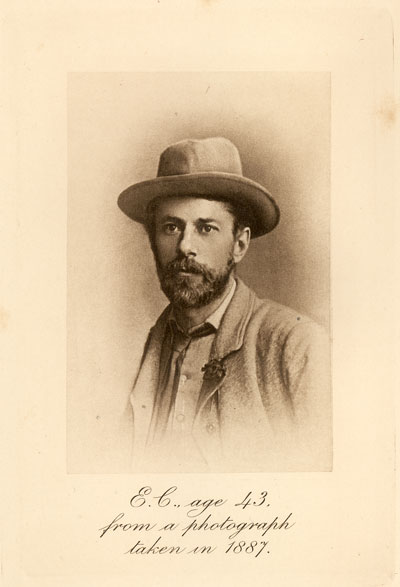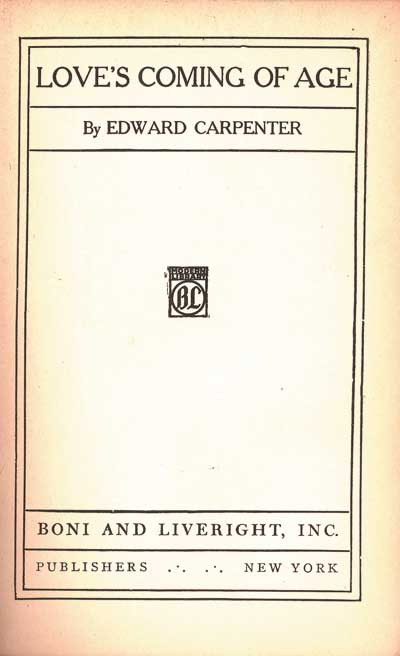Difference between revisions of "Wilson Collection: Edward Carpenter"
(Edward Carpenter) |
(Edward Carpenter) |
||
| Line 4: | Line 4: | ||
''(Frontis portrait of Edward Carpenter from Towards Democracy: Complete Edition in Four Parts; London: Swan Sonnenschein & Co. Limited / Manchester: S. Clarke, 1907. Also shown is the title page from Love’s Coming of Age, 1911)'' | ''(Frontis portrait of Edward Carpenter from Towards Democracy: Complete Edition in Four Parts; London: Swan Sonnenschein & Co. Limited / Manchester: S. Clarke, 1907. Also shown is the title page from Love’s Coming of Age, 1911)'' | ||
| − | |||
| − | |||
'''Edward Carpenter''' | '''Edward Carpenter''' | ||
Revision as of 10:47, 26 November 2012
(Frontis portrait of Edward Carpenter from Towards Democracy: Complete Edition in Four Parts; London: Swan Sonnenschein & Co. Limited / Manchester: S. Clarke, 1907. Also shown is the title page from Love’s Coming of Age, 1911)
Edward Carpenter
After visiting Walt Whitman, English Socialist Edward Carpenter concluded that the Poet “was before all a lover of the Male.”[1]
For Harlem Renaissance poet Countee Cullen, Carpenter's Ioläus “opened up for me soul windows.”[2] And a peek into The Intermediate Sex was for liberationist Harry Hay an “earthshaking revelation.”[3]
In Love's Coming of Age (1896) Carpenter wrote, “Love is...its own justification.”[4] However various its “combinations,” “only in the most exceptional cases, if at all, may public institutions venture to interfere with” it.[5]
References
- ↑ Jonathan Katz, Gay American History: Lesbians and Gay Men in the U.S.A. (New York: Thomas Y. Crowell, 1976), 365.
- ↑ George Chauncey, Gay New York: Gender, Urban Culture, and the Making of the Gay Male World, 1890-1940 (New York: Basic Books, 1994), 284.
- ↑ Stuart Timmons, The Trouble with Harry Hay: Founder of the Modern Gay Movement (Boston:Alyson Publications, 1990), 27.
- ↑ Edward Carpenter, Love's Coming of Age (New York: Boni and Liveright, 1911), 155.
- ↑ Carpenter, 155.

